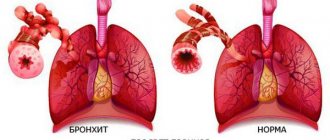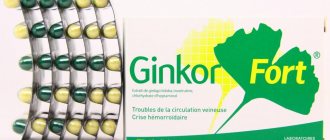Compound
| Granules for the preparation of solution for oral administration | 5 g |
| active substance: | |
| L-ornithine-L-aspartate | 3 g |
| excipients: anhydrous citric acid - 0.55 g; lemon flavoring - 0.02 g; orange flavoring - 0.2 g; sodium saccharinate (sodium saccharin) - 0.0045 g; sodium cyclamate - 0.0405 g; dye “Sunset” yellow - 0.0005 g; polyvinylpyrrolidone (povidone) - 0.05 g; fructose (levulose) - 1.1345 g |
Composition of the drug Hepa-Merz
The effectiveness of the drug is due to the presence of amino acids as the main components:
- L-ornithine;
- L-aspartate.
They, being natural constituents of the body, actively participate in metabolic processes, restoring liver function.
Hepa-Merz is produced in the form of granules or a solution in ampoules. Purified water acts as an additional component of the solution. And the granules contain citric acid, fructose and orange flavor. The granules are intended for dilution in water. The prepared solution is taken orally.
Pharmacodynamics
It has a detoxifying effect, reducing elevated levels of ammonia in the body, particularly in liver diseases. The effect of the drug is associated with its participation in the ornithine Krebs urea cycle (activates the cycle, restoring the activity of liver cell enzymes: ornithine carbamoyltransferase and carbamoyl phosphate synthetase). Promotes the production of insulin and growth hormone.
Improves protein metabolism in diseases requiring parenteral nutrition.
Helps reduce asthenic, dyspeptic and pain syndromes, as well as normalize increased body weight (with steatosis and steatohepatitis).
How does Hepa-Merz work?
First of all, it should be noted the ability of the drug Hepa-Merz to cleanse the body of toxins. When liver function is impaired, the ability to cleanse the blood of unnecessary substances, including toxic ones, first suffers. Among the most dangerous toxins is ammonia. With a healthy liver, all ammonia released as a result of protein metabolism is neutralized without the help of medications.
When the filtering organ itself fails to cope with its tasks, toxins, including ammonia, accumulate in the blood, which can lead to liver breakdown and brain damage. The initial stage of ammonia poisoning is expressed in memory loss, general deterioration of the condition and inhibition of reactions. As the severity of the lesion increases, so do the symptoms, which will ultimately lead to coma.
As a rule, a patient can guess about problems with the liver by diseases of other organs. The liver does not hurt, but its dysfunction leads to intoxication of the entire body. Hepa-Merz is worth buying at the first signs of general weakness, unexplained fatigue, and a feeling of weakness. Lack of vitality is the first sign of poisoning of the body and the development of asthenic syndrome. The drug successfully cleanses the blood and restores activity, which improves well-being and returns to performance.
Pharmacological properties of the drug Hepa-merz
Pharmacodynamics. Hepatoprotector - detoxifier. L-ornithine-L-aspartate acts on two main ammonia detoxification pathways—urea synthesis and glutamine synthesis—through the amino acids ornithine and aspartate. Urea synthesis occurs in perivenous hepatocytes, in which ornithine acts as an activator of two enzymes: ornithine carbamoyltransferase and carbamoylphosphate synthetase, and also as a substrate for urea synthesis. Glutamine synthesis occurs in perivenous hepatocytes. In pathological conditions, aspartate and dicarboxylates are captured by the perivenous cells of the liver, where they act as a substrate or stimulator for the activation of glutamine synthesis, the level of which decreases by 20% in liver cirrhosis. This leads to increased binding of ammonia in the form of glutamine (ornithine urea cycle). Physiologically and pathophysiologically, glutamine is not only a non-toxic form for the excretion of ammonia, but also an important activator of urea synthesis (intercellular glutamine exchange). Under physiological conditions, ornithine and aspartate do not inhibit urea synthesis. Experimental studies in animals have shown that increased glutamine synthesis is a mechanism that reduces ammonia. In some clinical studies, an improvement in the ratio of branched amino acids to aromatic amino acids was noted. Promotes the production of insulin and growth hormone. Improves protein metabolism in diseases requiring parenteral nutrition. Pharmacokinetics. L-ornithine-L-aspartate is broken down into ornithine and aspartate. Both amino acids have a short half-life of 0.3–0.4 hours. Part of the aspartate is excreted unchanged in the urine.
Hepa-Merz: patient reviews
Patients undergoing treatment with Hepa-Merz noted an improvement in their condition after just two weeks of use, regardless of which dosage form was used. In rare cases, the drug caused negative reactions, manifested by nausea or vomiting. Most of the negative reactions occurred in patients whose daily dose of the drug exceeded 6 ampoules or 6 bags of granules.
Reducing the dosage made it possible to continue treatment without side effects. Since patients with serious liver dysfunction experience severe reaction inhibition, taking Hepa-Merz had an effect on improving the speed of information perception. As a tangible effect, patients cite a surge of strength, a decrease in fatigue levels and an improvement in overall well-being.
Those patients who adhered to a diet in accordance with the so-called table No. 5 were able to speed up the recovery process. The menu in this case includes vegetable soups, lean meat and lean fish. Cooking involves minimal use of spices, including salt. It is allowed to prepare mashed potatoes with the addition of beets and green peas. Fresh fruit mousses, honey or marshmallows are allowed as dessert.
When cooking food, patients with liver damage are highly advised not to use frying and baking. It is better to give preference to steaming or cooking. Gentle food puts less stress on the liver, allowing the amino acids included in Hepa-Merz to restore its functions in a short time.
Hepa-Merz: instructions
If the patient is conscious and can eat on his own, it is recommended to use Hepa-Merz in granules as a medicine. Once in the body, they break down into components, including amino acids necessary for the full functioning of the liver and cleansing the body of toxins.
To prepare a single dose, dissolve 1 sachet in a glass of water. In case of severe damage to the body's filtration system, a single dose of two packets of granules dissolved in a glass of water is allowed. The duration of the course depends on the speed of recovery and the severity of the patient’s condition.
Patients with impaired swallowing reflex, as well as those who are unconscious, are prescribed Hepa-Merz by injection. The daily norm is 4 ampoules. When administered dropwise, the substance is dissolved in 500 ml of sodium chloride. The rate of droplet entry of the drug into the bloodstream should not exceed 5 g per hour.
If severe encephalopathy is diagnosed, the daily dose is increased to 8 ampoules. The duration of treatment in each individual case is determined individually. The liver is an organ that can recover, and depending on the patient’s age and individual characteristics, this process occurs at different speeds for everyone.
An indicator indicating the possibility of discontinuing the drug will be the test results with the values of ALT, AST, GGTP. As soon as these indicators return to normal limits, it will be possible to stop treatment, but continue to monitor the state of enzymes and the number of liver markers in the blood.
Special instructions for the use of Hepa-merz
When administering high doses of Hepa-Merz concentrate for infusion solution, the level of urea in the blood serum and urine should be monitored. In case of severe impairment of liver function, in accordance with the patient’s condition, it is necessary to reduce the rate of administration of the infusion solution in order to prevent nausea or vomiting. Although there are no reports of negative effects of Hepa-Merz during pregnancy and lactation, it should only be used during this period under the strict supervision of a physician. The disease itself affects the ability to drive vehicles and operate complex machinery, so this ability may be impaired in patients receiving Hepa-Merz.
Indications for use of the drug Hepa-merz
Concentrate for infusion solution:
- acute and chronic liver diseases accompanied by hyperazotemia (hepatitis, cirrhosis, fatty degeneration, toxic liver damage);
- hepatic encephalopathy (latent and severe), especially as part of complex therapy for impaired consciousness (precoma) or coma;
Granulate for preparing solution for oral administration:
- violation of the detoxification function of the liver (due to overeating and alcohol consumption);
- treatment of associated complications, in particular hepatic encephalopathy.
Hepa-Merz
Buy on Apteka.ru
All liver diseases - alcoholic, viral, metabolic, medicinal, autoimmune, etc. - are accompanied by a deterioration in its basic functions, among which detoxification plays a significant role.
Detoxification is the neutralization of toxins coming from the outside (alcohol, drugs, industrial harmful substances, etc.) and toxins formed in the human body itself every day in certain quantities (ammonia).
When the liver, due to acute or chronic liver diseases, ceases to adequately cope with toxins, the latter accumulate in the body and have a depressing effect on organs and systems, primarily on brain cells, on the liver itself and on muscle tissue.
Therefore, when treating the liver, it is first necessary to eliminate these unfavorable consequences of a violation of the neutralizing function of the liver, remove the toxic load from the body, thereby relieving the liver. In this case, restoration of hepatocyte function and normalization of all liver functions will occur faster and more efficiently.
This is exactly how the original German drug Hepa-Merz works for the treatment of acute and chronic liver diseases with a dual mechanism of action:
- Rapid detoxification The amino acids ornithine and aspartate in Hepa-Merz bind the ammonia toxin in various organs, the level of which is often elevated in liver diseases
- Improvement of liver tests (ALT, AST, GGTP indicators)
- Restoring the functioning of liver cells with a course of use of Hepa-Merz activates the liver cells’ own neutralizing systems.
- Improved well-being Weakness and fatigue disappear, mood and sleep normalize, concentration and reaction speed increase.
- Improving metabolism Hepa-Merz stimulates the synthesis of protein - a building element of liver cells, improves the exchange of insulin and somatotropic hormone.
- According to 87% of practicing doctors, the effectiveness of Hepa-Merz in the treatment of liver diseases is good and very good [1]
- Hepa-Merz is well tolerated in 98% of cases [2]
- 95.2% of patients noted an improvement in quality of life after a course of Hepa-Merz granules [2]
If, in chronic or acute liver disease, signs of hepatic encephalopathy are revealed - absent-mindedness, drowsiness during the day and insomnia at night, irritability, some lethargy, then to correct this condition it is recommended to use the German drug Hepa-Merz.
For preliminary self-diagnosis, you can take an express number connection test for free and in just 40 seconds on the website www.testpecheni.rf
When taken as a course, the drug Hepa-Merz effectively binds and quickly removes toxins, having a beneficial effect on both liver cells and brain cells and the entire body as a whole.
Find out more on the website www.hepa-merz.ru
- Grungreiff K., Lambert-Baumann J., Die Medizinische Welt, 2001; 52: 219-226.
- Ong PJ, Oehler G, Kruger-Jansen C et al. Clinical Drug Investigation 2011; 31 (4): 213-220.








